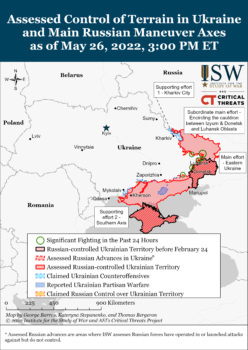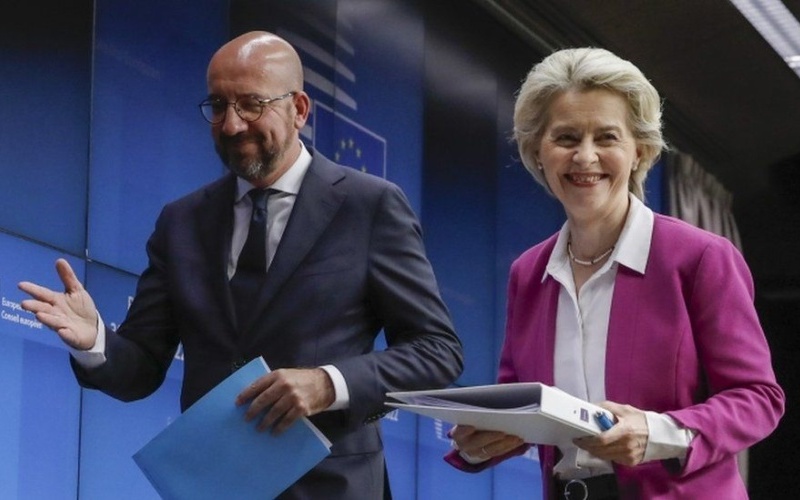European Commission President Charles Michel (L) and European Council President Ursula von der Leyen (EPA)
Monday’s Coverage: “Sievierodonetsk Has Been Destroyed”

Source: Institute for the Study of War
UPDATE 1657 GMT:
Trying to overrun the city, a Russian airstrike has hit a chemical plant in Sievierodonetsk in eastern Ukraine.
Luhansk governor Serhiy Haidai said the Russians hit “a tank with nitric acid at a chemical plant”. He urged residents to stay in shelters because of the acid’s dangerous effects.
UPDATE 1651 GMT:
Ukraine President Volodymyr Zelenskiy has welcomed the European Union’s package of sanctions against Russia and aid to Kyiv, but has criticised “unacceptable” delay.
Speaking alongside Slovakia’s President Zuzana Caputova in Kyiv, Zelenskiy said, “When over 50 days have passed between the fifth and sixth sanction packages, the situation is not acceptable for us.”
UPDATE 1002 GMT:
A Ukrainian court has sentenced two Russian soldiers to 11 1/2 years in prison, in the second war crimes verdict over Russia’s invasion.
Alexander Bobikin and Alexander Ivanov pleaded guilty to the shelling of a town in the Kharkiv region in northeast Ukraine.
Last week Russian Sgt. Vadim Shishimarin was sentenced to life in prison for shooting and killing a 62-year-old man in the Sumy region of northeast Ukraine.
UPDATE 0957 GMT:
Russian forces have freed one of four Ukrainians working for the Organization for Security and Cooperation in Europe monitoring mission.
OSCE Secretary General Helga Schmid tweeted:
Very relieved about the release of one @OSCE_SMM national mission member.
I urge for the release of the three colleagues who remain in detention in Donetsk and Luhansk and will continue to work tirelessly for their immediate return to their loved ones.
— Helga Maria Schmid (@HelgaSchmid_SG) May 31, 2022
The Russian invaders seized the four monitors as the OSCE pursued its oversight mandate, which expired at the end of March.
UPDATE 0944 GMT:
A senior advisor to Ukraine President Volodymyr Zelenskiy says the latest EU package, including sanctions on Russian oil, is insufficient.
Ihor Zhovkva said, “If you ask me, I would say far too slow, far too late and definitely not enough.”
He also criticized the pace of military aid: “We are definitely not satisfied. Had we been satisfied, we would have begun the liberation of Mariupol immediately and thrown away Russian forces from Donbas.”
UPDATE 0839 GMT:
A Russian proxy official in occupied Crimea says Russia has imposed its control of mobile and internet networks in the occupied Kherson and Zaporizhzhia regions in southern Ukraine.
Oleg Kryuchkov said the area “is now exclusively Russian internet and communications”, with SIM cards for Russian mobile operators on sale.
UPDATE 0834 GMT:
Russia has begun taking metal from the occupied port city of Mariupol in southern Ukraine.
A ship has left with 2,700 tons for the Russian city of Rostov-on-Don.
UPDATE 0634 GMT:
The wives and sisters of Ukrainian POWs, from the Azovstal steel works in the port city of Mariupol, have again appealed for their freedom.
Russian officials have indicated that more than 1,700 POWs would be used in show trials for Moscow’s propaganda about “extremists” and “neo-Nazis”. A Russian proxy official in eastern Ukraine threatened on Monday that death penalties could be imposed on the fighters who held out against 12 weeks of Russian bombardment, siege, and ground attacks.
Sandra Krotevych, the sister of Maj. Bohdan Krotevych, the executive officer and first deputy commander of the Azov Regiment, pleaded at a news conference in Kyiv:
I don’t know what location he was evacuated to, I don’t know what state of health he was in when he left.
Please, do not keep silent about them. We need to bring them home.
None of the six women at the conference have heard from the POWs.
Nataliia Zarytska, the wife of Bohdan Zarytsky, a soldier of the Azov Regiment, explained, “The last time I heard from my husband was May 17….Right now it is not clear to me if he is alive, in prison, or being tortured.
The Red Cross registered the POWs as they left Azovstal but has been allowed further access by Russia or Russian proxy officials.
Zarytska called on the organization to estabish twice-weekly communications between POWs and their relatives: “They confirmed that my husband walked out of the steel plant. Their duty now is to be the bridge between us and those who are now prisoners.”
The women said the wives, mothers, sisters and supporters of the fighters have formed an official group, The Women of Steel, to personalize the men by telling stories about their childhoods and their children.
UPDATE 0610 GMT:
Luhansk governor Serhiy Haidai has acknowledged a slow advance by Russian forces towards the center of the destroyed city of Sievierodonetsk, the focus of Moscow’s offensive in eastern Ukraine.
Russian proxy officials claimed that the offensive now occupies about 1/3 of Sievierodentsk, the easternmost point of Ukraine’s control.
Haidai said Ukrainian troops are not at risk of being encircled, as they can move west to Lysychansk across the Siverskyi Donets River.
Oleksandr Stryuk, the head of Sievierodonetk’s administration said, “The city is still in Ukrainian hands and it’s putting up a fight…[but] evacuations are not possible due to the fighting.”
ORIGINAL ENTRY: European Union leaders have agreed a phased cutoff of Russian oil, affecting 75% of imports immediately and 90% by the end of 2022.
After a day of intense discussions to overcome the objections of Hungary, European Council President Charles Michel announced the deal as a “remarkable achievement” that will place “maximum pressure on Russia to end the war” on Ukraine.
All seaborne imports from Russia are barred. There are exemptions for supply to Hungary, the Czech Republic, and Slovakia by pipeline.
Those three landlocked countries have a significant dependence on Russian oil. Perhaps more importantly, Hungarian Prime Minister Viktor Orbán is close to Vladimir Putin.
For four weeks, Orbán said he would block the EU’s sixth package of sanctions on Russia and aid to Ukraine. Even yesterday, he was proclaiming, “There is no compromise for this moment at all.” However, he left an opening if “there are solutions for the Hungarian energy supply security”.
The final agreement took shape as both Germany and Poland said they would take no deliveries via a pipeline to their countries. European Commission President Ursula von der Leyen hailed “an important step forward”, including a “massive investment in renewable energy” amid the diversification away from Russian oil. EU foreign policy chief Josep Borrell tweeted:
Welcome decision of EU leaders #EUCO to ban Russian oil.
A landmark decision to cripple Putin’s war machine.Our unity is our strength. #StopPutinsWar
— Josep Borrell Fontelles (@JosepBorrellF) May 30, 2022
The package also includes €9bn euros (£7.67bn) in assistance to Ukraine, an international fund to rebuild the country after the war, measures to move Ukrainian grain amid a Russian blockade of Black Sea ports, and curbs on rising energy prices.
Sanctions include blocking Russia’s largest bank, Sberbank, from the SWIFT global transactions system; a ban on three more Russian state-owned broadcasters; and further measures against “individuals responsible for war crimes in Ukraine”.
Michel said after the effort to achieve the necessary unanimity, “I think that more than ever it is important to show that we are able to be strong, that we are able to be firm, that we are able to be tough in order to defend our values and our interests.”
Latvia’s Prime Minister Krišjānis Kariņš added, “The big picture is that we have to starve Russia, Moscow, of the funds to continue the war. If each European country only thinks about itself then we will never move forward.”
Russia’s representative to international organisations in Vienna, Mikhail Ulyanov, fumed as he lashed out at Von der Leyen:
As she rightly said yesterday, #Russia will find other importers. Noteworthy that now she contradicts her own yesterday’s statement. Very quick change of the mindset indicates that the #EU is not in a good shape. https://t.co/MEtjlphv2U
— Mikhail Ulyanov (@Amb_Ulyanov) May 30, 2022

